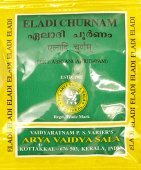Phalini, Phalinī: 11 definitions
Introduction:
Phalini means something in Hinduism, Sanskrit, Jainism, Prakrit, biology. If you want to know the exact meaning, history, etymology or English translation of this term then check out the descriptions on this page. Add your comment or reference to a book if you want to contribute to this summary article.
In Hinduism
Ayurveda (science of life)
Toxicology (Study and Treatment of poison)
Source: Shodhganga: Kasyapa Samhita—Text on Visha ChikitsaPhalinī (फलिनी) is the name of an ingredient used in the treatment (cikitsā) of rat poison (ākhu-viṣa), according to the Kāśyapa Saṃhitā: an ancient Sanskrit text from the Pāñcarātra tradition dealing with both Tantra and Viṣacikitsā—an important topic from Āyurveda which deals with the study of Toxicology (Viṣavidyā or Sarpavidyā).—Kāśyapa has recommended a slew of generic formulae that successfully neutralise rat poison.—According to Kāśyapasaṃhitā (verse 11.38cd-39cd): “Also recommended is the mixture of the skin of bitter gourd, turmeric powder, Phalinī flower and Kārīskara, as a drink and lepa or ointment. A combination of milk, pepper and cut ripe plantain is also an effective remedy.”.
Unclassified Ayurveda definitions
Source: Wisdom Library: Āyurveda and botanyPhalinī (फलिनी) is a variant spelling for Phalī, which is a synonym for Priyaṅgu, which is a Sanskrit name for a medicinal plant (Callicarpa macrophylla). It is a technical term used throughout Ayurvedic literature such as the Caraka-saṃhitā and the Suśruta-saṃhitā. The synonym Phalī was identified by Amarasiṃha in his Amarakośa (a Sanskrit botanical thesaurus from the 4th century). It is also mentioned as a synonym in the Bhāvaprakāśa-nighaṇṭu (medicinal thesareus) authored by Bhāvamiśra 16th century, in which it is listed as Phalinī.
Source: gurumukhi.ru: Ayurveda glossary of termsPhalinī (फलिनी):—Group of 19 plants whose fruits are indicated in Panchakarma.

Āyurveda (आयुर्वेद, ayurveda) is a branch of Indian science dealing with medicine, herbalism, taxology, anatomy, surgery, alchemy and related topics. Traditional practice of Āyurveda in ancient India dates back to at least the first millenium BC. Literature is commonly written in Sanskrit using various poetic metres.
Dharmashastra (religious law)
Source: Oxford Academic: Homo Ritualis: Hindu Ritual and Its Significance to Ritual TheoryPhalinī (फलिनी) (also Phalina) refers to “offering fruits and vegetarian saltless food” and represents one of the various marriage rites of the Hindu Newars, mentioned in the Daśakarmavidhi: a marriage handbook from Bhaktapur containing both Hindu and Newar marriage ceremonies.—Despite many congruencies between Hindu Parbatiyā and Hindu Newar marriage handbooks, it becomes evident that Newar marriage handbooks mention specific ritual elements that cannot be found in the Brahmanical-Sanskritic texts.—The Phalinī Chāye rite is usually performed at the House of the Groom and is mentioned under the sub-heading of “other marriage rites”.

Dharmashastra (धर्मशास्त्र, dharmaśāstra) contains the instructions (shastra) regarding religious conduct of livelihood (dharma), ceremonies, jurisprudence (study of law) and more. It is categorized as smriti, an important and authoritative selection of books dealing with the Hindu lifestyle.
Biology (plants and animals)
Source: Wisdom Library: Local Names of Plants and DrugsPhalini [फलिनी] in the Sanskrit language is the name of a plant identified with Aglaia elaeagnoidea from the Meliaceae (Neem) family having the following synonyms: Aglaia roxbughiana, Milnea roxburghiana, Nemedra elaeagnoidea. For the possible medicinal usage of phalini, you can check this page for potential sources and references, although be aware that any some or none of the side-effects may not be mentioned here, wether they be harmful or beneficial to health.
Source: Google Books: CRC World Dictionary (Regional names)1) Phalini in India is the name of a plant defined with Aglaia elaeagnoidea in various botanical sources. This page contains potential references in Ayurveda, modern medicine, and other folk traditions or local practices It has the synonym Milnea roxburghiana Wight & Arn. (among others).
2) Phalini is also identified with Aglaia odoratissima It has the synonym Aglaia diepenhorstii Miquel (etc.).
3) Phalini is also identified with Callicarpa macrophylla It has the synonym Callicarpa roxburghii Wall. ex Walp. (etc.).
4) Phalini is also identified with Lagenaria siceraria It has the synonym Cucurbita leucantha Duchesne (etc.).
5) Phalini is also identified with Milnea roxburghiana It has the synonym Aglaia abbreviata C.Y. Wu (etc.).
6) Phalini is also identified with Setaria italica It has the synonym Panicum germanicum Mill. (etc.).
Example references for further research on medicinal uses or toxicity (see latin names for full list):
· Darjeeling List (1896)
· Field Mus. Nat. Hist., Bot. Ser. (1937)
· Proceedings of the California Academy of Sciences, Series 2, (1873)
· Scientia Agricultura Sinica (1989)
· Mémoires de la Société de Physique et d’Histoire Naturelle de Genève (1825)
· Flore du Kouy-Tchéou (1915)
If you are looking for specific details regarding Phalini, for example pregnancy safety, diet and recipes, extract dosage, side effects, health benefits, chemical composition, have a look at these references.

This sections includes definitions from the five kingdoms of living things: Animals, Plants, Fungi, Protists and Monera. It will include both the official binomial nomenclature (scientific names usually in Latin) as well as regional spellings and variants.
Languages of India and abroad
Sanskrit dictionary
Source: DDSA: The practical Sanskrit-English dictionaryPhalinī (फलिनी).—The Priyaṅgu creeper; (said by poets to be the 'wife' of the mango tree; cf. mithunaṃ parikalpitaṃ tvayā sahakāraḥ phalinī ca nanvimau R.8.61).
See also (synonyms): phalī.
Source: Cologne Digital Sanskrit Dictionaries: Monier-Williams Sanskrit-English Dictionary1) Phalinī (फलिनी):—[from phalin > phal] f. a species of plant (= agni-śikhā or priyaṅgu), [cf. Lexicographers, esp. such as amarasiṃha, halāyudha, hemacandra, etc.]
2) [v.s. ...] (with yoni) the vagina injured by too violent sexual intercourse, [Suśruta]
Source: DDSA: Paia-sadda-mahannavo; a comprehensive Prakrit Hindi dictionary (S)Phalinī (फलिनी) in the Sanskrit language is related to the Prakrit word: Phaliṇī.
Sanskrit, also spelled संस्कृतम् (saṃskṛtam), is an ancient language of India commonly seen as the grandmother of the Indo-European language family (even English!). Closely allied with Prakrit and Pali, Sanskrit is more exhaustive in both grammar and terms and has the most extensive collection of literature in the world, greatly surpassing its sister-languages Greek and Latin.
Prakrit-English dictionary
Source: DDSA: Paia-sadda-mahannavo; a comprehensive Prakrit Hindi dictionaryPhaliṇī (फलिणी) in the Prakrit language is related to the Sanskrit word: Phalinī.
Prakrit is an ancient language closely associated with both Pali and Sanskrit. Jain literature is often composed in this language or sub-dialects, such as the Agamas and their commentaries which are written in Ardhamagadhi and Maharashtri Prakrit. The earliest extant texts can be dated to as early as the 4th century BCE although core portions might be older.
Kannada-English dictionary
Source: Alar: Kannada-English corpusPhalini (ಫಲಿನಿ):—
1) [noun] = ಫಲಿ [phali]3.
2) [noun] the creeper Tinosporia cordifolia ( = Menispermum cordifolium, = Cocculus cordifolius) of Menispermaceae family.
--- OR ---
Phaḷini (ಫಳಿನಿ):—[noun] = ಫಲಿ [phali]3.
Kannada is a Dravidian language (as opposed to the Indo-European language family) mainly spoken in the southwestern region of India.
See also (Relevant definitions)
Starts with: Phalinikusuma.
Ends with: Gorakshaphalini, Mridamgaphalini, Mridangaphalini, Nakhaphalini, Uttamaphalini.
Full-text (+13): Priyavalli, Uttamaphalini, Phalin, Phali, Priyangu, Mridamgaphalini, Nakhaphalini, Mridangaphalini, Urjavant, Phalavati, Cakraphani, Vahnishikha, Phalinikusuma, Palini, Vishvaksena, Mithuna, Phalina, Phalakhanda, Varavarnini, Harenu.
Relevant text
Search found 13 books and stories containing Phalini, Phalinī, Phaliṇī, Phaḷini; (plurals include: Phalinis, Phalinīs, Phaliṇīs, Phaḷinis). You can also click to the full overview containing English textual excerpts. Below are direct links for the most relevant articles:
Charaka Samhita (English translation) (by Shree Gulabkunverba Ayurvedic Society)
Chapter 3 - The Pharmaceutics of the Bottle Gourd (ikshvaku-kalpa) < [Kalpasthana (Kalpa Sthana) — Section on Pharmaceutics]
Rig Veda (translation and commentary) (by H. H. Wilson)
Rig Veda 10.97.15 < [Sukta 97]
Atharvaveda and Charaka Samhita (by Laxmi Maji)
Medicine in the Atharva-veda (Introduction) < [Chapter 3 - Diseases and Remedial measures (described in Atharvaveda)]
Medical Science in the Vedas < [Chapter 2 - The nature of treatment for diseases in the Ancient era]
Trishashti Shalaka Purusha Caritra (by Helen M. Johnson)
Part 6: Initiation of Ara < [Chapter II - Śrī Aranāthacaritra]
Appendix 4.2: New and Rare Words < [Appendices]
Kavyamimamsa of Rajasekhara (Study) (by Debabrata Barai)
Part 8.11 - Characteristics of Hementa-kāla (dewy season) < [Chapter 5 - Analyasis and Interpretations of the Kāvyamīmāṃsā]
Sushruta Samhita, Volume 6: Uttara-tantra (by Kaviraj Kunja Lal Bhishagratna)
Chapter XXXVIII - Treatment of the diseases of the female organ of generation < [Canto II - Kaumarabhritya-tantra (pediatrics, gynecology and pregnancy)]
Related products
(+2 more products available)





